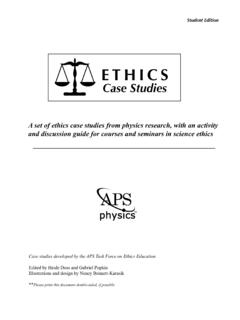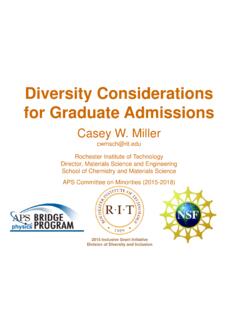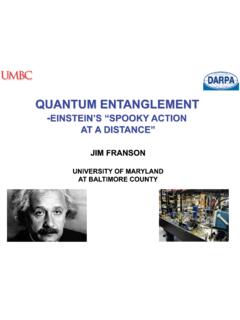Transcription of Case Studies - American Physical Society
1 Case Studies developed by the APS Task Force on Ethics EducationEdited by Heide Doss and Gabriel PopkinIllustrations and design by Nancy Bennett-Karasik**Please print this document double-sided, if possibleTeacher EditionA set of ethics case Studies from physics research, with an activity and discussion guide for courses and seminars in science ethicsTMCase StudiesETHICS1 Teacher EditionCase StudiesETHICSTMF oreword Research in physics depends on widely held values of integrity and honesty among participants. Without these values, the enterprise becomes suspect, and its results are mistrusted. It is important as scientists and educators that we demand ethical behavior on the part of all of the participants in all aspects of our enterprise. It is not sufficient to take for granted that participants are aware of what constitutes ethical behavior. For this reason the APS Ethics Education Task Force has put together this collection of case Studies to provide an introduction to some of the issues that practicing physicists might is useful to draw the analogy between ethics education and safety training.
2 Undoubtedly most physicists have an inherent desire to be safe, but the extent to which safety procedures are practiced in the lab depends on a range of factors, including prior experience, an understanding of appropriate procedures, and an understanding of what harm may come from failing to follow these procedures. Formal safety training is often useful to fill in the gaps not filled by prior experience. Likewise, ethics education can play the role of providing information not available from prior experience. This role is especially important for those just beginning in the reality is that ethical behavior in some instances is compromised by pressures to publish and discover, as well as by the prospect of financial gain from commercialization of certain research discoveries. The problem is complicated, because researchers may be confronted with choices in which the ethical route is not obvious.
3 There are also differences between practices in various sub-disciplines, especially in the area of authorship of papers for awareness of the ethical dilemmas that can occur in a professional career, and of the resources for understanding and resolving such problems, can help in avoiding ethical lapses, or limit the damage that can arise from them. Students and mentors are especially reminded that an understanding of the ethical expectations of the physics community is an important part of a physics education. Note: The ethics case Studies were prepared by a special APS Task Force on Ethics Education to promote discussion of these issues. Some of the Studies were also contributed by the general population. They are based on the views of the task force members, and should not be considered to be the views of APS as a on the APS Task Force on Ethics EducationThe APS Task Force on Ethics Education was formed in 2004, in response to several high-profile cases of ethics violations among physicists.
4 Its charge was to advise APS on how it can best encourage physics departments to do a better job of educating their students, postdocs, and faculty about scientific ethics; to investigate what materials are available for ethics education; and to develop materials or adapt existing materials to aid physics departments in their efforts. The Task Force released a report which is available at Force Members Allen M. Goldman, University of Minnesota (Chair) Beverly Karplus Hartline, Delaware State University Jean P. Krisch, University of Michigan J. Marshall Thomsen, Eastern Michigan University Brian Utter, James Madison University Simon Woodruff, University of Washington2 Teacher EditionCase StudiesETHICSTMI ntroduction to Ethics Case StudiesThis set of materials was first created by the APS Ethics Education Task Force to provide an introduction to some of the issues that practicing physicists might encounter.
5 Moreover, APS and the Task Force hoped these materials would generate a community-wide discussion that would improve our collective understanding of what it means to practice the inception of this project, there has been an increase in required education on scientific ethics. In January 2010, the National Science Foundation (NSF) instated the requirement that each application for funding in science or engineering research or in education include appropriate training and oversight in responsible and ethical conduct of research to undergraduate students, graduate students, and postdoctoral researchers participating in the proposed research project. In addition, the NSF requires institutions to provide training plans upon request, and to designate one or more persons to oversee compliance of training in the responsible and ethical conduct of research. For further information, see the first two items listed in the Resources section.
6 At the end of this document, and on the APS website, are a set of resources that provide further information on ethics in science and engineering research. These include books, documentation from organizations, courses, and conferences. These resources can be found by conducting an Internet search using their titles, or via links on the APS and Notes to the teacher in this Teacher s Edition are provided in this set of case Studies may be used in an ethics course, ethics seminar, or group discussion on the topic. To keep the discussion lively, it is suggested that various approaches appropriate for the audience be conducted. Examples of varied approaches include: role-plays of scenarios, creating video of scenarios, or creating cartoons of scenarios. In a class setting it is imperative that class discussions occur for each topic included below based on scenarios that represent the topic.
7 It is also recommended that discussion participants read the APS statements in the appendices before moving to the case Studies . Note that it is important to move the discussions from the realm of I feel or I think this is to a more concrete of comparison of actions (or proposed actions) to the standards of : Consider opening up a discussion and/or collecting written descriptions of scenarios that students would like to explore. This should be done in a way to allow anonymity, for example, students could create fictitious scenarios that contain some of the issues they are concerned with. In this way, students can learn what types of questions to ask in situations and how to address situations involving unclear ethical lines. Emphasize to students the importance of learning about appropriate conduct and ethics for various situations that students may encounter during their scientific endeavors and that many of the issues transcend EditionCase StudiesETHICSTMC ontentsCase Study TopicsConflicts of Interest.
8 4 Data Acquisition .. 9 Educational Concerns ..14 Health and Safety ..19 Research with Human Subjects ..21 Issues of Bias ..24 Mentoring ..27 Publication Practices ..41 Responsible Conduct of Research and Participation ..59 Appendices and Resources Appendix A: APS Guidelines for Professional Conduct ..67 Appendix B: APS Policies for Handling Allegations of Research Misconduct ..70 Appendix C: Federal Policy on Research Misconduct ..71 Ethics Education Resources ..754 Teacher EditionCase StudiesETHICSTMC onflicts of InterestIn the research environment, we are often faced with situations in which we could stand to benefit personally. These situations can include, for example, the use of university resources, telephone numbers, e-mail or web addresses to support or represent an outside activity, including businesses, hobbies and political activities.
9 These situations constitute a conflict of the technical regulations concerning conflict of interest are documented (for example in a university handbook). The regulations prohibit employees from improper participation in a variety of business transactions in which the employee may have an interest or be in a position to assist others, particularly those in whom the employee may have a direct or substantial economic interest (such as a spouse, or child). Appointments, terminations, promotions, demotions, and approval of salary increases all need to be carefully considered from the perspective of conflict of of the ethical issues explored in the three case Studies below relate to the less documented situations: cases where there are no clear guidelines to scenarios that include Conflicts of Interest: Publication Practices Case Study: Conflict of Interest in Refereeing (p 46) Publication Practices Case Study: Peer Review (p 55) Responsible Conduct of Research and Participation Case Study: Conflict of Interest (p 60)Suggested assignments:1.
10 Define conflict of interest and provide three Determine if the institution you are attending has documentation on conflicts of interest and, if so, describe what this documentation of Interest5 Teacher EditionCase StudiesETHICSTMC onflict of Interest Case Study: Confidentiality Scenario 1 You are a sixth-year graduate student at a large university in the final months of your dissertation research on novel photonic materials. You are worried about your next appointment, and have applied for several postdoctoral positions in this field plus a few tenure-track assistant professorships at universities where you would like to work. To your surprise and pleasure, you are invited for an interview for a tenure-track appointment at your undergraduate alma mater, a prestigious research institution in a city where you already have connections and would love to the question-and-answer period following your seminar on your research, the department chair asks for detailed information about the novel material-preparation technique developed in your graduate research, and used extensively in your experiments.




